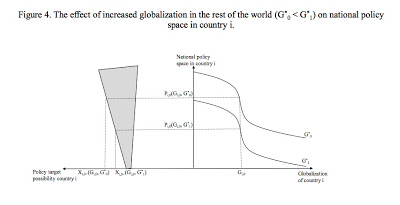Summary:
As a followed up on my recent discussion on Dani Rodrik's paper, below Tom Palley's critique of Rodrik's trilemma between globalization, national sovereignty, and democratic politics. Tom argues that there is no trilemma, only a dilemma, and that democracy is not on the same plane. From his paper "A Theory of Economic Policy Lock-in and Lock-out via Hysteresis: Rethinking Economists’ Approach to Economic Policy."Rodrik (2011) has argued that globalization poses a trilemma between globalization, national sovereignty, and democratic politics. He argues that you can have any two, but not all three. The framework in Figure 3 qualifies that interpretation. From the perspective of the nation state there is no trilemma, only a dilemma. National sovereignty can be identified with national policy space. Globalization creates a trade-off between national policy space and the degree of globalization, with national policy space declining as globalization deepens. Democracy is not at issue. Countries can be outside of globalization and democratic, or they can be engaged in globalization and democratic. Democratic politics is always viable. The problem is globalization diminishes the “content” of democratic politics, as measured by the achievable range of the policy target. It is these type of concerns that motivate criticism of trade agreements like the Trans-Pacific Partnership.
Topics:
Matias Vernengo considers the following as important: Globalization, Palley, Rodrik, Trilemma
This could be interesting, too:
As a followed up on my recent discussion on Dani Rodrik's paper, below Tom Palley's critique of Rodrik's trilemma between globalization, national sovereignty, and democratic politics. Tom argues that there is no trilemma, only a dilemma, and that democracy is not on the same plane. From his paper "A Theory of Economic Policy Lock-in and Lock-out via Hysteresis: Rethinking Economists’ Approach to Economic Policy."Rodrik (2011) has argued that globalization poses a trilemma between globalization, national sovereignty, and democratic politics. He argues that you can have any two, but not all three. The framework in Figure 3 qualifies that interpretation. From the perspective of the nation state there is no trilemma, only a dilemma. National sovereignty can be identified with national policy space. Globalization creates a trade-off between national policy space and the degree of globalization, with national policy space declining as globalization deepens. Democracy is not at issue. Countries can be outside of globalization and democratic, or they can be engaged in globalization and democratic. Democratic politics is always viable. The problem is globalization diminishes the “content” of democratic politics, as measured by the achievable range of the policy target. It is these type of concerns that motivate criticism of trade agreements like the Trans-Pacific Partnership.
Topics:
Matias Vernengo considers the following as important: Globalization, Palley, Rodrik, Trilemma
This could be interesting, too:
Matias Vernengo writes Paul Davidson (1930-2024) and Post Keynesian Economics
Angry Bear writes Has Globalization Been Reversed?
Matias Vernengo writes Paul Davidson (1930-2024)
As a followed up on my recent discussion on Dani Rodrik's paper, below Tom Palley's critique of Rodrik's trilemma between globalization, national sovereignty, and democratic politics. Tom argues that there is no trilemma, only a dilemma, and that democracy is not on the same plane.
From his paper "A Theory of Economic Policy Lock-in and Lock-out via Hysteresis: Rethinking Economists’ Approach to Economic Policy."
Rodrik (2011) has argued that globalization poses a trilemma between globalization, national sovereignty, and democratic politics. He argues that you can have any two, but not all three. The framework in Figure 3 qualifies that interpretation. From the perspective of the nation state there is no trilemma, only a dilemma.
National sovereignty can be identified with national policy space. Globalization creates a trade-off between national policy space and the degree of globalization, with national policy space declining as globalization deepens. Democracy is not at issue. Countries can be outside of globalization and democratic, or they can be engaged in globalization and democratic. Democratic politics is always viable. The problem is globalization diminishes the “content” of democratic politics, as measured by the achievable range of the policy target.
It is these type of concerns that motivate criticism of trade agreements like the Trans-Pacific Partnership. Whereas trade agreements fifty years ago were about reducing tariffs and quotas, today they are “global governance agreements (Palley, 2016)” that are writing the rules of a new world order. These global governance agreements fundamentally impact national policy space. A clear example of this is the new system governing disputes between governments and foreign-based corporate investors, which involves an extra-legal investor – state dispute settlement (ISDS) process that is outside of nations’ own legal systems. As Renato Ruggerio (1996), the first General Secretary of the World Trade Organization observed at its onset: “We are no longer writing the rules of interaction among separate national economies. We are writing the constitution of a single global economy.”
In fact, the problem is likely more complex than illustrated in Figure 3 because a country that seeks to avoid globalization may still find its policy space impacted by globalization. This is illustrated in Figure 4. As globalization increases in the rest of the world (G*0 < G*1), policy space decreases in country i despite unchanged local engagement with globalization (Pi,0(Gi,0, G*0) > Pi,0(Gi,0, G*1)), which reduces the achievable range of the policy target (Xi,0+( Gi,0, G*0) > Xi,0+( Gi,0, G*1)). That is because globalization is relational. When other countries deepen their globalization, that imposes additional constraints on countries that do not follow suit because it negatively impacts the latter’s network of relations. The exact nature of this shift will depend on the type of globalization adopted by the rest of the world.
Read full paper here.


